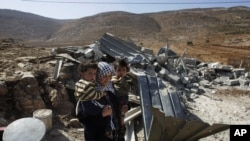The Israeli Cabinet unanimously approved a proposal to build over 700 housing units for Palestinians in addition to 6,000 Israeli settlement housing units in the West Bank.
Prime Minister Benjamin Netanyahu’s government advanced the proposal late on Tuesday, according to an Israeli official, speaking on condition of anonymity to describe the closed-door meeting.
The approval appeared timed to coincide with a visit by President Donald Trump’s son-in-law and chief Mideast envoy Jared Kushner, who is expected in the region this week.
The permits would be for construction in what is known as Area C — the roughly 60% of the West Bank where Israel exercises full control and where most Jewish settlements are located. Netanyahu’s government has approved the construction of tens of thousands of settler homes there, but permits for Palestinian construction are extremely rare.
Israel captured the West Bank, along with east Jerusalem and the Gaza Strip, in the 1967 Mideast war. The Palestinians seek these areas as parts of a future state. Most of the international community considers Israeli settlements in the West Bank illegal under international law and an impediment to a two-state solution to the conflict.
Nabil Abu Rudeineh, a spokesman for Palestinian President Mahmoud Abbas, responded to the Israeli decision by saying the Palestinians have the right to build on all territory occupied in 1967, “without needing a permit from anyone.”
“We will not give any legitimacy to the construction of any settlement,” he added.
The Western-backed Palestinian Authority has control of civilian affairs in Areas A and B, which include the West Bank’s main Palestinian cities and towns.
Since capturing the West Bank and east Jerusalem in 1967, Israel has settled some 700,000 of its citizens in the two areas, which are considered occupied territory by most of the world.
Touring new construction in the West Bank settlement of Efrat, south of Jerusalem, Netanyahu said Wednesday that “not a single settlement or a single settler will ever be uprooted.”
Transportation Minister Bezalel Smotrich, a religious nationalist in Netanyahu’s government, wrote on Facebook that he backed the construction of Palestinian housing in Area C because “it prevents the establishment of a terrorist Arab state in the heart of the land” and asserts Israeli sovereignty over Area C.
Peace Now, an Israeli organization opposed to West Bank settlements, said in a statement that the approval of 700 housing units for Palestinians “is a mockery” because it “will not provide real answers to Palestinians who already live in Area C, and certainly will not help the entire West Bank to be developed as a Palestinian area.”
Kushner is returning to the Middle East this week to promote the administration’s call for a $50 billion economic support plan for the Palestinians, which would accompany a Mideast peace proposal that the administration has yet to release.
The Palestinians have rejected the agreement out of hand and cut off all contact with the Trump administration, saying its policies are unfairly biased toward Israel.
The Trump’s administration’s Mideast team is spearheaded by people with close ties to Israel’s settler movement. His ambassador to Israel, David Friedman, recently told the New York Times that Israel has the “right” to annex some of the West Bank.
Both critics and supporters of the settlements say the White House’s friendly attitude has encouraged a jump in settlement activity.




